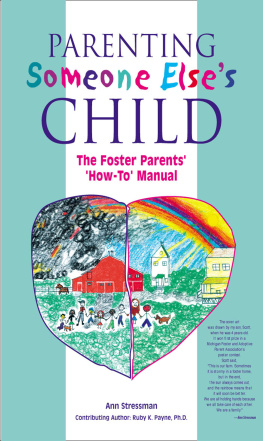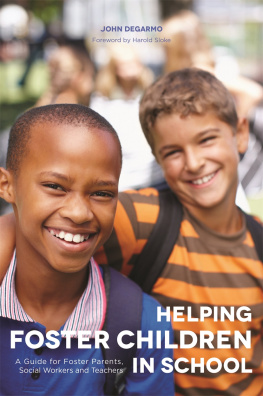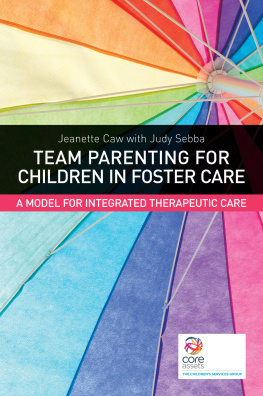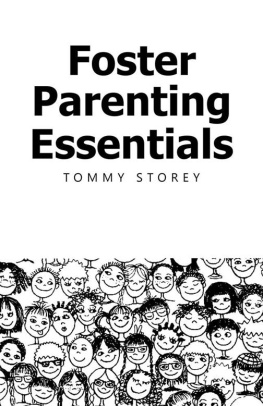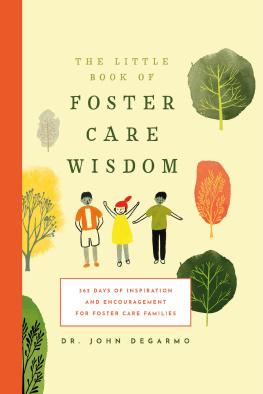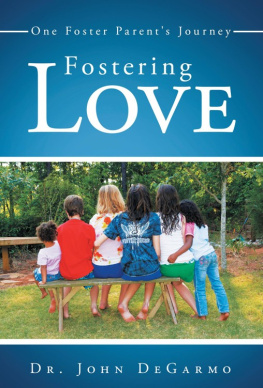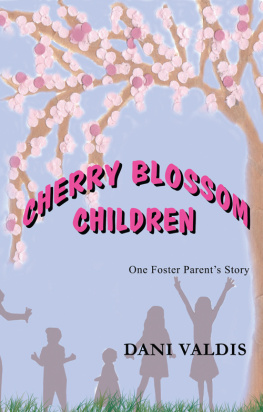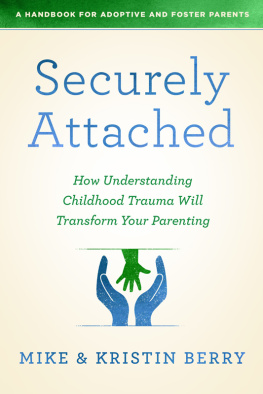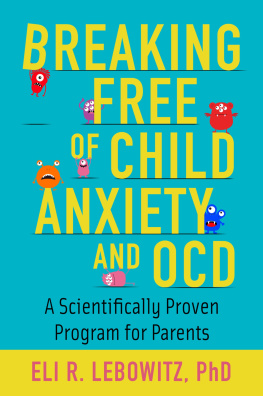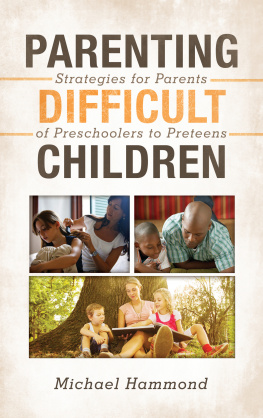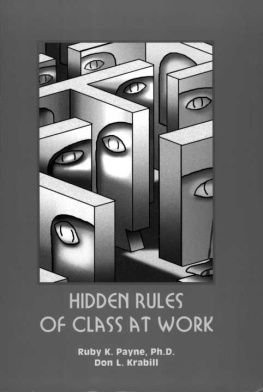Ann Stressman - Parenting Someone Elses Child: The Foster Parents How-To Manual
Here you can read online Ann Stressman - Parenting Someone Elses Child: The Foster Parents How-To Manual full text of the book (entire story) in english for free. Download pdf and epub, get meaning, cover and reviews about this ebook. year: 2004, publisher: aha! Process, Inc., genre: Children. Description of the work, (preface) as well as reviews are available. Best literature library LitArk.com created for fans of good reading and offers a wide selection of genres:
Romance novel
Science fiction
Adventure
Detective
Science
History
Home and family
Prose
Art
Politics
Computer
Non-fiction
Religion
Business
Children
Humor
Choose a favorite category and find really read worthwhile books. Enjoy immersion in the world of imagination, feel the emotions of the characters or learn something new for yourself, make an fascinating discovery.
- Book:Parenting Someone Elses Child: The Foster Parents How-To Manual
- Author:
- Publisher:aha! Process, Inc.
- Genre:
- Year:2004
- Rating:4 / 5
- Favourites:Add to favourites
- Your mark:
- 80
- 1
- 2
- 3
- 4
- 5
Parenting Someone Elses Child: The Foster Parents How-To Manual: summary, description and annotation
We offer to read an annotation, description, summary or preface (depends on what the author of the book "Parenting Someone Elses Child: The Foster Parents How-To Manual" wrote himself). If you haven't found the necessary information about the book — write in the comments, we will try to find it.
After fostering more than 100 children in two decades, Ann Stressman describes how Ruby Paynes hidden rules of economic class help parents understand much of their foster childrens thinking and behaviors.
Ann Stressman: author's other books
Who wrote Parenting Someone Elses Child: The Foster Parents How-To Manual? Find out the surname, the name of the author of the book and a list of all author's works by series.
Parenting Someone Elses Child: The Foster Parents How-To Manual — read online for free the complete book (whole text) full work
Below is the text of the book, divided by pages. System saving the place of the last page read, allows you to conveniently read the book "Parenting Someone Elses Child: The Foster Parents How-To Manual" online for free, without having to search again every time where you left off. Put a bookmark, and you can go to the page where you finished reading at any time.
Font size:
Interval:
Bookmark:

Stressman, Ann E.
Special contribution by Ruby K. Payne, Ph.D.
Parenting Someone Else's Child: 202 pp.
Bibliography: pp. 187-188
ISBN-13: 978-1-92922-925-3
ISBN-10: 1-92922-925-9
ePub ISBN: 978-1-934583-81-4
1. Education 2. Sociology 3. Title
__________________________________
Copyright 2004 by aha! Process, Inc. Revised 2006
Published by aha! Process, Inc.
All rights reserved. Printed in the United States of America. No part of this book may be reproduced in any manner whatsoever without written permission, except in the case of brief quotations embedded in critical articles and reviews. For information, address aha! Process, Inc., P.O. Box 727, Highlands, TX 77562-0727; fax (281) 421-9852; www.ahaprocess.com
Copy editing by CopyProof
Cover design by Artlink
DEDICATION
T HIS BOOK IS DEDICATED TO FOSTER AND ADOPTIVE PARENTS EVERYWHERE. There are certain challenges in keeping a child for a long time and others in keeping one for a short time. An emergency shelter home takes in children without prior notice, until they can be assessed and a longer-term placement can be made. These foster parents may take hundreds of children in their lifetime. Others may take one child, raise that child as their own, and send him/her out into the world with survival skills that have a lasting effect on his/her life and generations to follow.
We need every one of these foster and adoptive homes to fill the needs of every child who comes into the system. No one of us is more valuable than another. So here's to you, foster and adoptive parents. You're special!
I also want to dedicate this book to Dr. Craig Matheson and Dr. Gailord Weeks, both of Fremont, Michigan. They are the most important people in my support system and in the actual day-to-day life of every person in this family and every person who entered my home since 1990. These two men played vital roles in helping my fostering and adopting be successfuland they continue to be strong allies in my retirement. Indeed, I still depend on them as I parent my adopted children and my granddaughter. There would have been no book without them! They also helped me believe that my experience and knowledge could be useful to other parents.
So thank you, Dr. Weeks and Dr. Matheson, for encouraging and supporting the growth and development of this book, just as you nurtured the growth and development of my children.
A WORD FROM THE AUTHOR
T HROUGHOUT HISTORY, PEOPLE HAVE RAISED THE CHILDREN OF OTHERS. Some of these children are well-known from the pages of history or the Bible. Moses was the first foster child, reads a button I sometimes pin to my blouse. But I doubt he was the first.
Today, in some segments of American society, it's common for a child to live with his grandmother, aunt, or even a surrogate parent, with no legal paperwork involved. Grandparents are increasingly given custody of children. The children may have parents who are drug addicted, alcoholic, or homeless, and cannot parent them. One of the parents may be deceased. Teenagers give birth to babies while still in high school, and it has become acceptable in today's society to keep your baby, raising it with the help of your own parents.
But, as with the job of parenting our own children, there has been no class to teach us, no instruction book supplied, no how-to manual. Foster and adoptive parents are required to attend classes prior to becoming licensed, but caseworkers are so overloaded they aren't always available to give ongoing help and support, even during a crisis. All of this gave rise to this book.
For 20 years I was a foster parent. For the past eight of those years, I have been married to a man who pledged to support me in this endeavor. I also have taught parenting skills to parents of delinquents who become involved in the court system. In addition, I have read widely on the subject of foster and adopted children. Much of my research has been on attention deficit disorder (ADD) and attention deficit hyperactivity disorder (ADHD). I have used ideas from many authors, developed some of them into workable systems for foster children and other special needs children, and taken them into the classroom. I have given seminars to parents of these children, as well as attended countless classes myself to gain the latest ADD research data and management techniques. Also, from a general standpoint, I have been a parent trainer, which has involved doing workshops for pre-licensing requirements, as well as conducting ongoing classes for foster/adoptive parents. Much of child management is common sense, and a number of these techniques have been used and adapted by many parents and educators. In preparation for the seminars I've led, I've read hundreds of pages of advice from others, then passed on the cream of the crop to frustrated and struggling parents.
My book is a summary of these ideas, along with my own hard-won insights, in the hope that you can glean some kernel of understanding, some technique, some method to help you and your child succeed. Teachers can't hope to be able to read about every special need. Parents may not have the time or knowledge to sift through the hundreds of new titles hitting the market, all claiming to have the answer.
It is my hope that I can teach while learning, help while being helped, and make some friends along the way. I believe that if we all help each other, we'll do a much better job of raising the next generationand save ourselves from having nervous breakdowns in the process!
As you grow and learn, so does your child. As your family benefits, so does the community. If there is a healthy relationship between you and your child, both lives will be richer and happier in the long run. Send me a letter and let me know how you're doing Better yet, look me up when you're in the neighborhood. The house may be a mess, and I might not be able to find the coffee, but we'll laugh and cry togetherand hug our children all the while.
Mama Ann
ON CHILDREN
by Kahlil Gibran
And a woman who held a babe against her bosom said, Speak to us of Children.
And he said:
Your children are not your children.
They are the sons and daughters of Life's longing for itself.
They come through you but not from you,
And though they are with you yet they belong not to you.
You may give them your love but not your thoughts,
For they have their own thoughts.
You may house their bodies but not their souls,
For their souls dwell in the house of tomorrow, which you cannot visit, even in your dreams.
You may strive to be like them, but seek not to make them like you.
For life goes not backward nor tarries with yesterday.
You are the bows from which your children as living arrows are sent forth.
The archer sees the mark upon the path of the infinite, and He bends you with His might that His arrows may go swift and far.
Let your bending in the archer's hand be for gladness;
For even as He loves the arrow that flies, so He loves the bow that is stable.
From THE PROPHET by Kahlil Gibran, copyright 1923 by Kahlil Gibran and renewed 1951 by Administrators C.T.A. of Kahlil Gibran Estate and Mary G. Gibran. Used by permission of Alfred A. Knopf, a division of Random House, Inc.

Why Is Parenting Someone Else's Child
Different?
M ANY YEARS AGO, A FRIEND ASKED ME, NOT IN JEST, IF I WOULD TAKE HIS BIOLOGICAL TEENAGE SON INTO MY HOME, RAISING HIM THROUGH THE HIGH SCHOOL YEARS. I asked him why he, an experienced foster parent, thought I could do any better with the boy than he could. Because you don't have a
Font size:
Interval:
Bookmark:
Similar books «Parenting Someone Elses Child: The Foster Parents How-To Manual»
Look at similar books to Parenting Someone Elses Child: The Foster Parents How-To Manual. We have selected literature similar in name and meaning in the hope of providing readers with more options to find new, interesting, not yet read works.
Discussion, reviews of the book Parenting Someone Elses Child: The Foster Parents How-To Manual and just readers' own opinions. Leave your comments, write what you think about the work, its meaning or the main characters. Specify what exactly you liked and what you didn't like, and why you think so.

